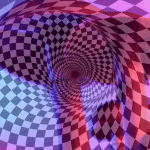Berlin is a famously hedonistic city where a wide variety of psychoactive substances are easily accessible via encrypted messaging apps and delivery services. But far fewer resources are available for those who might have challenging drug experiences, leaving many to deal with lingering effects and mental health issues without professional help. Thankfully, the medical community is starting to recognize this gap in supportive services, with one clinic called the Ambulanz Psychedelische Substanzen providing help to those dealing with psychedelics-related problems, and have nowhere else to go.
Ambulanz Psychedelische Substanzen is an outpatient clinic located in St. Hedwig Hospital, an art deco-style brick and wood building that is one of Berlin’s oldest and most respected hospitals. The clinic was started in 2018 by psychiatrist Tomislav Majić, and according to The Guardian, which first reported this story, it serves between 10 to 15 patients a month, and a couple of dozen virtual clients. Doctors assist patients in diagnosing their issues and finding therapeutic or medical interventions. For those based in Germany, these treatments—which range from one to 25 sessions per individual—are covered by public health insurance.
Majić told DoubleBlind that the idea for the service arose from his observation that people who experience mental health issues after using psychedelics often have no appropriate place to seek help. “In traditional psychiatry, psychedelics are still frequently equated with addictive substances, and patients are often advised to undergo detox, which misses the point,” Majić said. “On the other hand, in the psychedelic community, people with post-psychedelic disorders are often not well-received because they challenge the ideological belief that psychedelics are inherently safe and superior to conventional medications.”
READ: CEO of Psilocybin Mushroom Company Is Arrested for Alleged Stock Fraud
Thus, Majić established this service to provide a more complex approach to psychedelics and mental health beyond the typical media coverage, which tends to follow binary, all-positive or negative perspectives. “There is currently a lot of positive media coverage surrounding psychedelic substances,” added Dario Jalilzadeh Masah, an assistant doctor at the clinic. “However, it is crucial to remember that these substances also carry risks, are not suitable for everyone, and are only appropriate for a limited range of conditions.” Majić noted that because the clinic is part of Charité, a university hospital in Berlin, it receives no specific funding from the government.
The most common problems that patients face are Hallucinogen Persisting Perception Disorder (HPPD) and Depersonalization/Derealization Disorder (DDD). The former is characterized by persistent visual alterations that last beyond the trip, while the latter is marked by feelings of being disconnected from their emotions. The doctors also encounter patients suffering from anxiety disorders or psychotic episodes after using psychedelics. “Lastly, there is a group of patients who have had overwhelming psychedelic experiences that they struggle to cope with, even though they do not suffer from any clearly defined psychiatric condition,” said Dario Jalilzadeh Masah, an assistant doctor at the clinic. “One could say that these individuals most closely align with the concept of post-psychedelic integration: ‘How can I make sense of an experience so otherworldly and intense that it has turned my life upside down?’”
In some cases, the doctors will give off-label medication for severe cases of HPPD. But many times, they focus more on providing psychotherapy or emotional validation. “The most important validation we provide is giving individuals the feeling of being understood and heard, and the reassurance that they are not alone in their experience,” said assistant doctor Derin Marbin. “We also see it as our role to give patients confidence that their condition will not last forever.”
DoubleBlind is a trusted resource for news, evidence-based education, and reporting on psychedelics. We work with leading medical professionals, scientific researchers, journalists, mycologists, indigenous stewards, and cultural pioneers. Read about our editorial policy and fact-checking process here.
DoubleBlind Magazine does not encourage or condone any illegal activities, including but not limited to the use of illegal substances. We do not provide mental health, clinical, or medical services. We are not a substitute for medical, psychological, or psychiatric diagnosis, treatment, or advice. If you are in a crisis or if you or any other person may be in danger or experiencing a mental health emergency, immediately call 911 or your local emergency resources. If you are considering suicide, please call 988 to connect with the National Suicide Prevention Lifeline.
DoubleBlind Mag Read More


